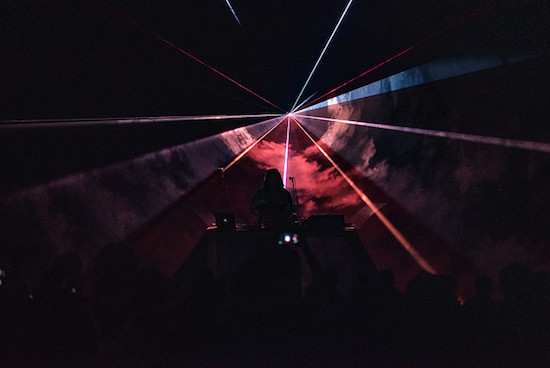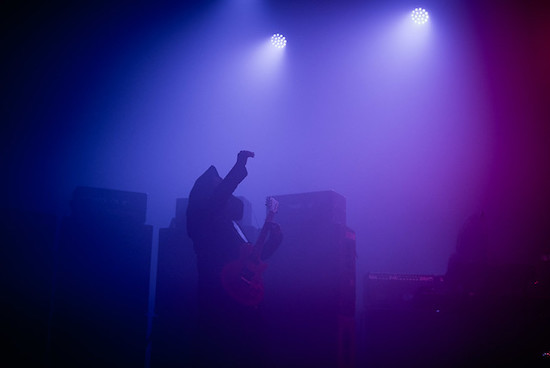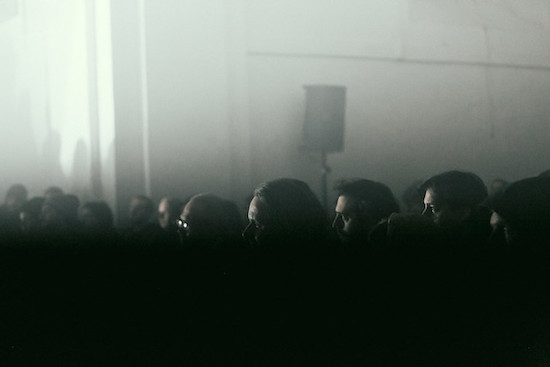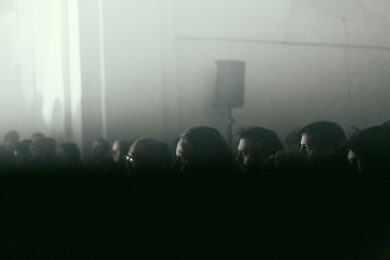Elevate Festival by Johanna Lamprecht
Familiarity Breeds Fondness
Returning to an annual festival multiple times is an interesting experience. Like a cousin you only see once a year, it’s a relationship that may evolve in sudden leaps – wrinkles seeming to appear or weight seeming to disappear instantaneously. For the most part though, the more important role of an annual festival is that of a constant – just like your cousin Dave, who’s always a good laugh whenever you see him and if only you would manage it more often. It’s one of the few entities in modern music’s constantly evolving landscape that you can check in on and rely on, just like those certain labels, local venues, and, dare I say it, websites and mags (such as tQ).
As a Brit who moved to Austria about a year before the referendum result, the Elevate Festival – held annually in the country’s second city of Graz – represents just such a constant.
The potentially gaudy title of Elevate has always been a nifty tesseract of meanings. It perhaps implies the chance to get intoxicated, or the simple euphoria of gigging. Maybe it’s just a reference to the elevator you can take up and down the hollowed out mountain where the festival takes place? (I end up doing dozens of journeys a night in it every year, chasing as much of the schedule as possible.) It could also refer to the festival’s desire to lift up and raise socio-political issues, as it does during its parallel programme of talks and discussions, or even perhaps to lifting some of those lesser-known artist out of obscurity via its bill. Maybe it’s just a chance to lift the city of Graz out of its blissful slumber?.
A las Barricadas
While the concept of the ‘festival-as-resistance’ is nothing new, it’s something that’s been increasingly deployed as a selling point in recent years following… ahem… you know… all this mess. When it comes to Elevate however, it’s been a key part of its character since its inception back in 2005. As such, music from the extremes of noise and club music sits alongside political commentary here as a matter of standard practice. Norwegian vocalist Stine Janvin really fills the role of an aptly revolutionary musical figure, holding mass in an stoney imperial mausoleum on Thursday night. Donning sunglasses (to cope with them strobes), Janvin stretches and skews and twists her voice into the faux Synthetic Music documented on her eponymous PAN album from last year.
Melodies bleep from her voice box and into a simple echo, skilfully hit with mechanic precision for full psychedelic effect, blurring that line between the organic and the synthetic. Like staring into a zoetrope it’s dizzying and revealing, and the closer you listen the more you’ll hear. Hers is a superhuman musical act, and one based firmly in physical prowess rather than digital tech. Solo sets by Warp-signed prepared-pianist Kelly Moran and intensely skilled multi-instrumentalist Peter Broderick fill up the rest of the evening, never matching Janvin’s sheer intensity (although one must admit, Broderick is an inescapably charming presence).

Subtlety Can Surprise
The sheer strength of heviosity and loud noises is obviously one of life’s great pleasures, and the Friday night at Graz’s Orpheum seems to be aiming for just that. Sunn O))) are headlining with support from Australian A/V artist Robin Fox and Danish noise merchant Puce Mary. I only knew him via some Danceworks composed with countrymen Oren Ambarchi, so Fox exceeds my expectations, manning a busy array of lights and ear-piercing electronics. He fires laser patterns above the crowd that mimic his blaring computer music, painting impossible digital pictures in the air while our ears beg for mercy.
Puce Mary however, is continuing to take a step away from total power electronics and into the more considered emotion and ambient sculpture of 2018’s The Drought. Particularly in the second half of her show, the speakers stop roaring and start rather to murmur; the lights gradually swap flashing to humming. The billowing mushroom clouds summoned in the noisier opening of the show begin to disperse, and Puce Mary spirals gradually downwards into a rich heavenly place of gnarled ambience. No longer, as one punter put it, is she “just Pharmakon lite”, but rather a key figurehead in a fresh and melodic 21st century noise.
The “Sunn O))) experience” is now almost something of a rite of passage for underground music heads. “Have you seen them before?” we all ask each other before the show. “Yeah twice, it was awesome – I remembered to bring ear protection this time!” The heaviest possible stoner drones emerge from the fog before any cloaks are even visible, and as the show goes on the group’s mastery of what they do seems sharper than ever, windmill arms slowly signalling each giant chord step like a shepherd at night conducting the stars. I think I can make out three extra musicians beyond the core duo this time – another guitar, a keyboard, a trombone? – but the most striking thing about the drones is how bathed in light they seem. Sunn O))) has always been a project that straddles the line between total black and total light. Just look at their album titles. If this show is representative though, their next LP, Life Metal should add deeper complexity to the spirituality they’ve plunged since 2009’s Monoliths & Dimensions. Theirs is a music you most certainly have feel rather than hear, so while the shape of their show follows the well tried and tested Sunn O))) method, the intangible content of those drones increasingly suggests heaven over hell. Still powerful. Still good. Will it ever get old? NO!

Hold And Release Needs More Hold; Less Release
As usual, Elevate does well to serve up a party. The Bug surprises us all by showing up to control the backing for a solo show by his protégé Miss Red. Paula Temple fills a large room with asses shaking to hours of noisy techno. A young Slovenian DJ by the name of Moska is a surprise highlight on the smaller Tunnel stage, with a masterful vinyl-only set of footwork, juke, and hip hop. There’s a an outright crazy night-long takeover by Hyperdub artist such as Kode9, Ikonika, and Okzharp + Manthe Ribane bringing back-to-back sets of club fire. The weekend’s basically brimming with club music that spoon-feeds us pleasure.
Ewa Justka takes a different approach though. Residing in London for ages now (though she later assures me she is imminently leaving the city before it becomes entirely devoid of all cultural life), Justka originates from Poland, and has spent years fiddling with homemade electronics, hardware hacking, and DIY techno. She distills acid techno down to bass thump, kick drum thump, arpeggiated synths, and perhaps most importantly, and immensely blinding strobe aimed right at the audience. From a tiny handful of gizmos, Justka creates something that races ever-onward, guiding looped elements in and out of the mix with expert patience.
The strobe is linked to the kick, so long passage of beatless synth fiddling in the dark segue into climactic gabberesque highs with every dancer in the room forced to close their eyes by the blinding strobe. The effect brings all in attendance closer together, and most importantly shuts us all up and gets us all dancing. In 2019, I thought we found ourselves perhaps just after the crest of a second or third golden age in club music – but Ewa Justka’s unique kind of DIY, dance-friendly, and live-performed sensory overload moves that crest into our future.



